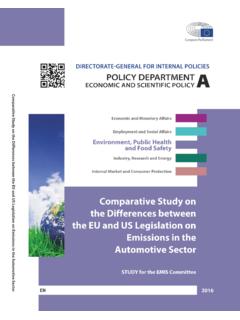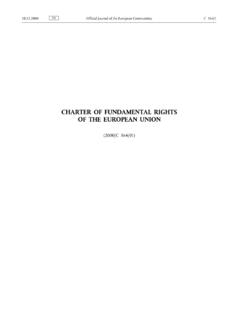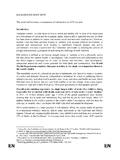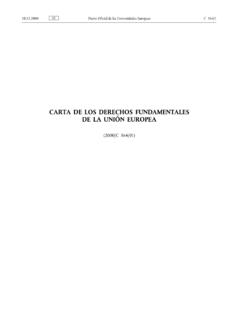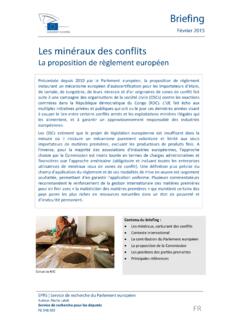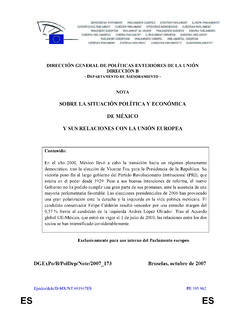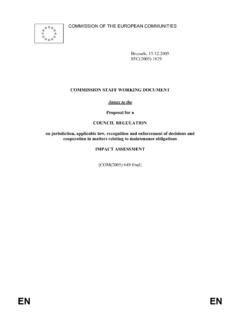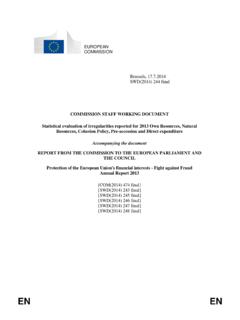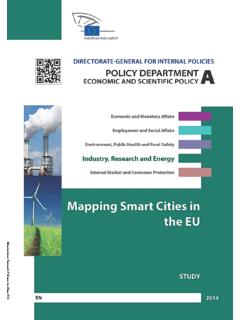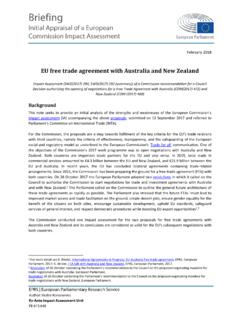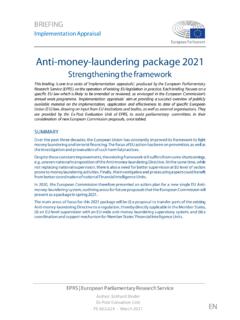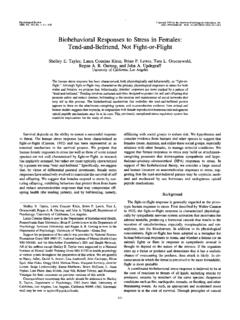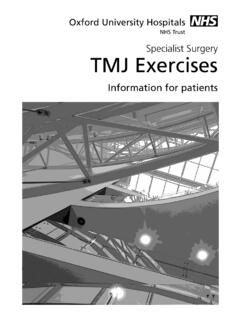Transcription of European Parliament
1 European Parliament2019-2024 TEXTS ADOPTEDP9_TA(2022)0038 Strengthening Europe in the fight against cancer European Parliament resolution of 16 February 2022 on strengthening Europe in the fight against cancer towards a comprehensive and coordinated strategy (2020/2267(INI))The European Parliament , having regard to its decision of 18 June 2020 on setting up a special committee on beating cancer, and defining its responsibilities, numerical strength and term of office1, having regard to the working document of its Special Committee on Beating Cancer of 27 October 2020 entitled Inputs of the Special Committee on Beating Cancer (BECA) to influence the future Europe s Beating Cancer Plan 2, having regard to the Commission communication of 3 February 2021 on Europe s Beating Cancer Plan (COM(2021)0044), having regard to the EU s Framework Programme for Research and Innovation 2021-2027 (Horizon Europe)3 and the dedicated Horizon Europe Mission on Cancer4, having regard to the Commission communication of 11 December 2019 on the European Green Deal (COM(2019)0640), having regard to the Council conclusions of 15 June 2021 on access to medicines and medical devices for a stronger and resilient EU5, having regard to the guides developed by the Joint Actions on cancer (EPAAC, CANCON, iPAAC) and the Rare Cancer Agenda 2030 established under the Joint Action on Rare Cancers (JARC),1 OJ C 362, , p.
2 Working document of 27 October Regulation (EU) 2021/695 of 28 April 2021 establishing Horizon Europe the Framework Programme for Research and Innovation, laying down its rules for participation and dissemination (OJ L 170, , p. 1).4 Interim report of the Mission Board for Cancer entitled Conquering cancer: Mission possible .5 OJ C 269 I, , p. 3. having regard to the Commission communication of 30 September 2020 on a new ERA for Research and Innovation (COM(2020)0628), having regard to Council Recommendation 2003/878/EC of 2 December 2003 on cancer screening1, having regard to the report of the International Agency for Research on Cancer (IARC) of May 2017 on the implementation of the Council Recommendation on cancer screening2, having regard to the European guidelines for quality assurance in breast, cervical and colorectal cancer screening and diagnosis, having regard to the Commission communication of 20 May 2020 entitled A Farm to Fork Strategy for a fair, healthy and environmentally friendly food system (COM(2020)0381), having regard to the Commission communication of 28 June 2021 on the EU strategic framework on health and safety at work 2021-2027 (COM(2021)0323)
3 , having regard to the Commission communication of 25 November 2020 on the Pharmaceutical Strategy for Europe (COM(2020)0761), having regard to the Commission communication of 14 October 2020 entitled Chemicals Strategy for Sustainability Towards a Toxic-Free Environment (COM(2020)0667), having regard to the Commission communication of 12 May 2021 entitled Pathway to a Healthy Planet for All EU Action Plan: Towards Zero Pollution for Air, Water and Soil (COM(2021)0400), having regard to Directive 2004/37/EC of the European Parliament and of the Council of 29 April 2004 on the protection of workers from the risks related to exposure to carcinogens or mutagens at work (the Carcinogens and Mutagens Directive CMD)3, including its three amending directives and the proposal by the Commission for the fourth amending directive (COM(2020)0571), having regard to Council Directive 98/24/EC of 7 April 1998 on the protection of the health and safety of workers from the risks related to chemical agents at work4, having regard to the public consultation synopsis report of its Special Committee on Beating Cancer of 19 April 2021 entitled The impact of the COVID-19 pandemic on cancer prevention, health services, cancer patients and research.
4 Lessons from a public health crisis ,1 OJ L 327, , p. OJ L 158, , p. OJ L 131, , p. 11. having regard to the Commission communication of 11 November 2020 entitled Building a European Health Union preparedness and resilience (COM(2020)0724), and to the related Commission proposals for, and the provisional agreements on, regulations of the European Parliament and of the Council of 11 November 2020 on serious cross-border threats to health (COM(2020)0727), on a reinforced role for the European Medicines Agency in crisis preparedness and management for medicinal products and medical devices (COM(2020)0725), and amending Regulation (EC) No 851/2004 establishing a European Centre for disease prevention and control (COM(2020)0726), having regard to Regulation (EU) 2021/522 of the European Parliament and of the Council of 24 March 2021 establishing a Programme for the Union s action in the field of health ( EU4 Health Programme )
5 For the period 2021-20271, having regard to the Commission proposal for, and the agreement on, a regulation of the European Parliament and of the Council on health technology assessment and amending Directive 2011/24/EU (COM(2018)0051), having regard to Regulation (EU) No 536/2014 of the European Parliament and of the Council of 16 April 2014 on clinical trials on medicinal products for human use, and repealing Directive 2001/20/EC2 (the Clinical Trials Regulation) and to the Clinical Trials Information System set up in accordance with that regulation, having regard to Regulation (EU) 2021/694 of the European Parliament and of the Council of 29 April 2021 establishing the Digital Europe Programme3, having regard to Report No 21/2019 of the European Environment Agency (EEA) entitled Healthy environment, healthy lives: how the environment influences health and well-being in Europe 4, having regard to the opinion of the European Economic and Social Committee of 9 June 2021 on Europe s Beating Cancer Plan5, having regard to the conclusions and recommendations of the study prepared for its Panel for the Future of Science and Technology (STOA) in July 2021 on The health impact of 5G 6, having regard to the UN Sustainable Development Goals (SDGs), in particular SDG 3 on good health and well-being, having regard to the fourth edition of the European Code Against Cancer7,1 OJ L 107, , p.
6 OJ L 158, , p. OJ L 166, , p. OJ C 341, , p. (2021) having regard to the European Code of Cancer Practice1, having regard to the Commission communication of 24 March 2021 entitled EU strategy on the rights of the child (COM(2021)0142), having regard to the Commission staff working document of 19 July 2018 on combatting HIV/AIDS, viral hepatitis and tuberculosis in the European Union and neighbouring countries State of play, policy instruments and good practices (SWD(2018)0387), having regard to the report of the World Health Organization (WHO) of 2020, entitled Alcohol and cancer in the WHO European Region: An appeal for better prevention 2, having regard to the activity and conclusions of the all-party interest group MEPs Against Cancer (MAC), having regard to its resolution of 15 January 2020 on the European Green Deal3, having regard to its resolution of 2 March 2017 on EU options for improving access to medicines4, having regard to its resolution of 10 July 2020 on the Chemicals Strategy for Sustainability5, having regard to its resolution of 12 February 2019 on the implementation of the Cross-Border Healthcare Directive6, having regard to its resolution of 16 January 2019 on the Union s authorisation procedure for pesticides7, having regard to its resolution of 10 July 2020 on the EU s public health strategy post-COVID-198, having regard to its resolution of 17 September 2020 on the shortage of medicines how to address an emerging problem9.
7 Having regard to its resolution of 15 December 2016 on the regulation on paediatric medicines10 and the Commission s inception impact assessment concerning the revision of the EU legislation on medicines for children and rare diseases,1 OJ C 270, , p. OJ C 263, , p. OJ C 371, , p. OJ C 449, , p. OJ C 411, , p. OJ C 371, , p. OJ C 385, , p. OJ C 238, , p. 128. having regard to Rule 54 of its Rules of Procedure, having regard to the report of its Special Committee on Beating Cancer (A9-0001/2022), Europe s Beating Cancer Plan ( the Plan ) should effectively respond to the call for progress by the families and health professionals of the 1,3 million people who die from cancer each year in Europe, including 6 000 children and young people, the crucial needs of patients who are currently in need of timely diagnosis and effective, innovative, accessible and affordable treatments and care for cancer and cancer-related complications and comorbidities, the rightful expectations of more than 12 million cancer survivors and their families facing the difficult return back to a normal life , the clear will of future generations to be protected against health threats and risk factors, and the concern of governments facing a growing economic and social burden from cancer and its related treatments.
8 Whereas Union actions in the fight against cancer should aim to increase the five-year survival rate of cancer patients; Europe represents less than 10 % of the world s population, but accounts for a quarter of all cancer cases, and whereas cancer is the second leading cause of death in Europe after cardiovascular diseases and the first cause of death by disease in children older than one year; whereas the specific needs of children and adolescents with cancer require continued attention and support globally, and paediatric oncology should be differentiated from adult cancer management; whereas although there has been a slight decrease in mortality rates thanks to screening campaigns, improved diagnostics and therapeutic innovation, the number of cases diagnosed is nevertheless increasing, notably due to longer life expectancies, which result in ageing populations; whereas almost three quarters of all cancer diagnoses in the EU occur in people aged 60 or above; cancer illustrates social injustice and inequity in healthcare, as differences in cancer survival rates across the EU Member States exceed 25 %; whereas EU citizens are facing inequities in terms of prevention, and are unequally protected against risk factors, unequally educated in terms of healthy behaviours and unequally equipped against misinformation.
9 Whereas EU citizens are unequal in terms of timely access to affordable and quality treatment and care from Member State to Member State and from region to region in any given country; whereas access to fully multidisciplinary and multiprofessional medical teams varies widely across Europe; whereas after recovery or when in remission, EU citizens are unequal in their ability to return to work, to be financially independent and to return to a harmonious familial, social and emotional life; whereas class and gender are important measures and drivers of inequalities and inequities at all stages of the disease; specific national or regional cancer policies have been set up in most Member States, whose missions, capacities and budgets are heterogeneous; whereas some regions have become hubs in the fight against cancer, with an expertise that should be shared all over the Union; the goal of the Plan should not only be to fight against a crucial public health issue and to help patients live longer and better lives, but should also be to initiate a reduction in health inequalities and inequities and lower the social and economic burden of the disease; whereas the Commission should promote a patient-centred and citizens rights-based approach by integrating considerations of justice, sustainability, equity, solidarity, innovation and collaboration at the very core of the Plan, including its Helping Children with Cancer Initiative.
10 The COVID-19 pandemic has caused, and is still causing, severe disruptions to cancer screening programmes, treatment, research, and survivorship and follow-up services, with the resulting impact on cancer patients, families and healthcare professionals; whereas the pandemic has created an urgent need to build back cancer services in all European countries and to address highly concerning backlogs in prevention actions, as well as in early detection and diagnosis; whereas an estimated 100 million screening tests were not performed in Europe during the pandemic and 1 million cancer cases are undiagnosed; whereas 1 in 5 cancer patients did not receive the surgical or chemotherapy treatment they needed on time1; whereas healthcare professionals have taken on the burden of a pandemic and have had to cope in a very stressful working environment; health literacy includes the acquisition of knowledge and skills, awareness of rights and the confidence to take action to improve persona
